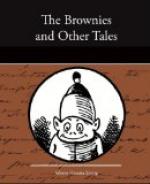Those tea-cakes were always good; to-night they were utterly delicious; there was a perfect abandon of currants, and the amount of citron peel was enervating to behold. Then the housekeeper waited in awful splendour, and yet the Doctor’s authority over her seemed as absolute as if he were an Eastern despot. Deordie must be excused for believing in the charms of living alone. It certainly has its advantages. The limited sphere of duty conduces to discipline in the household, demand does not exceed supply in the article of waiting, and there is not that general scrimmage of conflicting interests which besets a large family in the most favoured circumstances. The housekeeper waits in black silk, and looks as if she had no meaner occupation than to sit in a rocking-chair, and dream of damson cheese.
Rustling, hospitable, and subservient, this one retired at last, and—
“Now,” said the Doctor, “for the verandah; and to look at the moon.”
The company adjourned with a rush, the rear being brought up by the poodle, who seemed quite used to the proceedings; and there under the verandah, framed with passion-flowers and geraniums, the Doctor had gathered mats, rugs, cushions, and arm-chairs, for the party; while far up in the sky, a yellow-faced harvest moon looked down in awful benignity.
“Now!” said the Doctor. “Take your seats. Ladies first, and gentlemen afterwards. Mary and Tiny, race for the American rocking-chair. Well done! Of course it will hold both. Now, boys, shake down. No one is to sit on the stone, or put his feet on the grass: and when you’re ready, I’ll begin.”
“We’re ready,” said the girls.
The boys shook down in a few minutes more, and the Doctor began the story of
“The brownies.”
“Bairns are a burden,” said the Tailor to himself as he sat at work. He lived in a village on some of the glorious moors of the north of England; and by bairns he meant children, as every Northman knows.
“Bairns are a burden,” and he sighed.
“Bairns are a blessing,” said the old lady in the window. “It is the family motto. The Trouts have had large families and good luck for generations; that is, till your grandfather’s time. He had one only son. I married him. He was a good husband, but he had been a spoilt child. He had always been used to be waited upon, and he couldn’t fash to look after the farm when it was his own. We had six children. They are all dead but you, who were the youngest. You were bound to a tailor. When the farm came into your hands, your wife died, and you have never looked up since. The land is sold now, but not the house. No! no! you’re right enough there; but you’ve had your troubles, son Thomas, and the lads are idle!”




